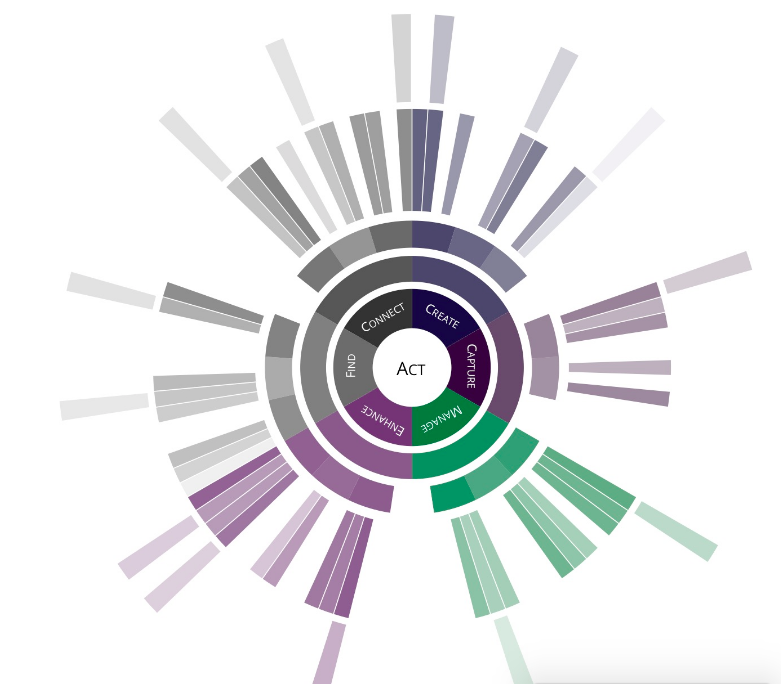As I’ve often asserted, Knowledge Management struggles with its own identity. There are any number of definitions of KM, many of which put too much stress on the tacit knowledge side of the knowledge and information management spectrum, are overly academic, or are simply too abstract. At Enterprise Knowledge, we’ve adopted a concise definition of knowledge management:
Knowledge Management involves the people, process, culture, and enabling technologies necessary to Capture, Manage, Share, and Find information.

The actions at the end of that sentence are the most critical component. All good KM should be associated with business outcomes, value to stakeholders, and return on investment. We discuss these actions as follows:
- Capture entails all the forms in which knowledge and information (content) move from tacit to explicit, unstructured to structured, and decentralized to centralized. This ranges from an expert’s ability to easily share their learned experience, to a content owner’s ability to upload a document they’ve created or edited.
- Manage involves the sustainability and maturation of content, ensuring content becomes better over time instead of becoming bloated, outdated, or obsolete. This is about the content itself, its format, style, and architecture. Management also covers the appropriate controls and workflows necessary to protect it, and the people who may access it.
- Share includes both an individual’s and organization’s ability and capacity to collaborate and pass knowledge and information via a variety of means, ranging from one-to-one to one-to-all, synchronous to asynchronous, and direct to remote.
- Find covers the capabilities for the knowledge and information to be easily and naturally surfaced. The concept of findability goes well beyond traditional “search,” and includes the ability to traverse content to discover additional content (discoverability), connect with experts, and receive recommendations and “pushes.”
We’ve taken this simple definition as the foundation for what we call our KM Action Wheel. The Action Wheel expresses the type of actions we seek to encourage and enable for the organizations and individuals with whom we work. It adds a bit of additional specificity to the aforementioned:
- Create recognizes that a key element of good KM is not simply the capture of existing knowledge, but the creation of new knowledge. This can take a number of forms, from allowing knowledge creation by an individual via innovation forums or social reporting, to group knowledge creation via better and improved collaboration and collaboration systems.
- Enhance focuses on the fact that effective KM will lead not just to the creation and capture of knowledge, but the sustainable improvement of that knowledge. In short, this means creation and stewardship of the leadership, processes, and technologies to make information “better” over time rather than having it fall into disrepair. Content’s natural state is entropy, and good KM will counteract that. Enhancement also covers the application of metadata, comments, or linkages to other information in order to improve the complete web of knowledge.
- Connect drills in on the “Find” action mentioned above, recognizing that KM is more than access to knowledge and information in paper or digital forms, it is also about direct access and formation of connections with the holders of that knowledge. This concept is even more critical with more and more well-tenured experts leaving the workforce and taking their knowledge with them. The more KM can connect holders of knowledge with consumers of knowledge, the smarter an organization is, and the more effective it can be about transferring that knowledge.
KM is important, simply put, because many, if not most, organizations and their employees struggle to perform these aforementioned actions easily, consistently, or at all. Effective KM is that which allows individuals and organizations to perform the actions discussed above in an intuitive, natural, and relatively simple manner.
This is not to say that KM isn’t already happening in any number of good ways. Many organizations with whom we work have already invested significantly in their own KM maturity or are at least ready to do so. When we conduct a KM assessment for an organization we even more frequently find “hero KM’ers” who are doing their best to perform these actions not because it is part of their job description, or because their boss told them to, or because the company processes make it easy to do so, but because they understand their value and are trying. Very few organizations are starting from “0,” and many have the potential to make meaningful steps if they know how to proceed.

About the Author: Zach Wahl is an expert in knowledge and information management strategy, content strategy, and taxonomy design. Zach is passionate about forming and supporting high-functioning teams and facilitating results-focused outcomes with his clients.

